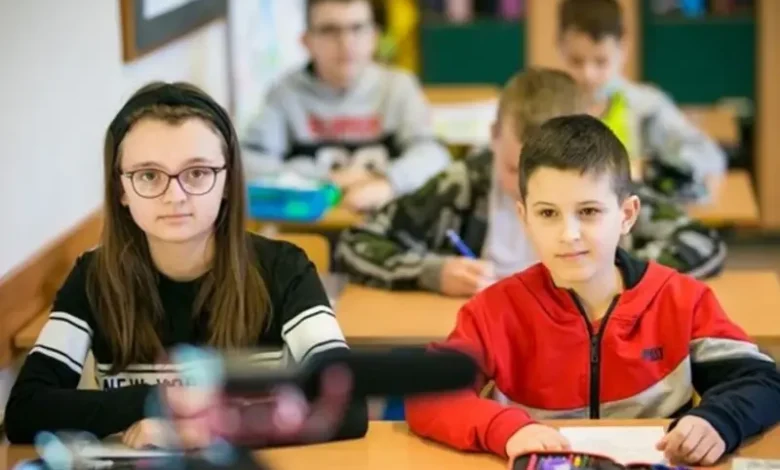A new system of study abroad is introduced for Ukrainian students

The Ministry of Education and Science of Ukraine recently implemented important changes in the education system, in particular for Ukrainian children who ended up abroad due to the war. These innovations aim to preserve the educational connection between Ukrainian students and their native country, taking into account the challenges of new realities of life. In conditions where more than 330,000 children are forced to adapt to studying in foreign schools, the Ministry decided to compromise and ease the conditions of education for these students, avoiding a double burden and complicated bureaucratic procedures. However, this decision causes different reactions among educators, parents and students themselves.
Problems of dual education: why change is needed
“The consequences of educational losses, which we can already see today, are extremely serious. According to PISA-2022, the level of knowledge of Ukrainian teenagers is at least two years behind the required level, and this is an alarm signal for the entire society. Educational losses do not just affect the individual development of a child – in the long run, they can hold back the economic and social progress of the entire country.
Due to forced relocations and gaps in education during the war, many children did not have the opportunity to acquire sufficient knowledge and practical skills. It is not only a matter of school grades. This is the development of soft skills and socialization skills, these are future professional opportunities, successes that may remain unrealized.
The World Bank predicts that these students will collectively lose billions of dollars in income over their lifetime due to educational losses. This is a real threat to our human capital and the development of the entire country. We are currently working on a strategy to return children to full-time education – this is not just a point solution. This is our commitment to the future of the state, our chance to provide children with the necessary knowledge, skills and confidence, which are so important for their successful implementation in life and for a strong future of Ukraine“, – stated Deputy Minister of Education and Science Nadiya Kuzmichova.
Before the implementation of the reform, Ukrainian students who studied abroad faced significant difficulties in combining the educational programs of the two countries. One of the main problems is that the schedules of classes in local schools of foreign countries often did not coincide with Ukrainian ones, which led to overloading of children and even endangered their success both in the local school and in the Ukrainian one. This became a real challenge for children, their parents and teachers, as it required considerable effort to combine both education systems.
Parents also felt pressure due to the need to control simultaneous studies in Ukrainian and foreign schools, which only increased the stress for the whole family. There were cases when children even thought about completely abandoning the Ukrainian education system due to the difficulty of its integration into a new life.
The solution of the Ministry of Education and Culture: simplification for the sake of efficiency
In response to these challenges, the Ministry of Education and Science of Ukraine decided to change the approach to the education of Ukrainian children abroad. A special “Ukrainian studies component” was introduced, which allows children to focus on key subjects: Ukrainian language, literature, history of Ukraine, geography and defense of Ukraine. Students study all other subjects in their foreign schools, and their grades are automatically entered in Ukrainian school diaries.
This reform, as explained by Deputy Minister of Education and Science Nadiya Kuzmichova, is aimed at ensuring that children do not lose touch with Ukrainian culture and language, but at the same time are not overloaded with additional studies.
“Students who are abroad cannot join classes while a lesson is in progress at a Ukrainian school. Because they study in local schools. For this category, a Ukrainian studies component was introduced as early as 2023 (a shortened program in which children can to study subjects that are not available in foreign schools – ed.).
This allows children living abroad to learn only the Ukrainian language, literature, history, jurisprudence, geography and defense of Ukraine. The rest of the student’s subjects are re-enrolled. Recommendations for teachers on how to do this have been developed.
The Ukrainian studies component is not only about education. It is also about the child’s connection with our state. Yes, we offer to compromise on something. And this compromise is based on trust. We trust French, Polish, any other school that has graded the student. And we advise you not to test the child once more, not to create additional assessments to make sure that this assessment is correct. Because what is the result of this? The child refuses to study not in a Polish school, but in a Ukrainian one.
Our teachers seem to have the right logic here, because we all want to give children quality knowledge. But Ukraine has not yet encountered such a scale of migration. And in educational policies, it is important to lay down something that binds and leaves a person’s connection with Ukraine.” – said Kuzmichova.
According to her, the basis of the new program is trust in foreign educational systems. The Ukrainian authorities have recognized that the level of education in many countries where Ukrainian children are now meets high standards. Taking this into account, it was decided not to complicate the process of verification of grades that students receive in foreign schools. This allows you to avoid duplicating the educational process and focus on important aspects of Ukrainian culture and history that remain mandatory for Ukrainian students.
Parents’ reaction: are these changes enough?
Despite the desire of the Ministry of Education and Culture to simplify the process, the reaction to the innovation was mixed. Some parents express gratitude for the simplification of the educational process, because it allows them to fully focus on studying at a foreign school. However, there is another side – skeptics who believe that the new rules may cause the loss of a deep connection with the Ukrainian education system.
According to Kuzmichova, some students feel that if the Ukrainian school demands an excessive workload, they can simply abandon it in favor of a foreign one. This raises concerns that simplifying the system may lead to the alienation of some children from Ukrainian culture and educational traditions.
Statistical data
Official data indicate that more than 330,000 Ukrainian children currently live abroad, but this figure may be much higher due to the unavailability of complete information about those who are in occupied or temporarily uncontrolled territories.
“We have the AIKOM system (Automated information complex of educational management – ed.). According to the data we have in our AIKOM, where there is a student profile card, there are 331,903 children abroad. There is also a certain error, up to 10% .
These are the children we see in the education system. There are more people who are actually abroad. Because some have already left our education system, they have made a choice in the direction of another country and are no longer studying with us.
But, unfortunately, not only we, but also no European country knows how many of them are abroad. Due to the absence of borders within the EU, a child who crossed our border can study in any state. There is no exchange of registers between European countries.
The UN provides certain data. But there they can count the same children twice. When they studied in Poland, and then moved to, say, Germany. And then there is duplication of data for one child in a European country”, – said the deputy minister.
Will the new reform be able to keep children in the Ukrainian education system
Despite the efforts of the Ministry of Education and Science, the question remains: is this reform enough to preserve the connection of Ukrainian children with their native country? Although the simplification of learning conditions helps to reduce stress for students, there are still concerns about maintaining identity and high-level education. Will it be possible to support children’s interest in Ukrainian education with the help of new rules, when they are offered other prospects in foreign schools?
The decision of the Ministry of Education and Science of Ukraine regarding the adaptation of educational conditions for children abroad is an attempt to find a compromise between the demands of time and the preservation of educational ties with the native country. However, time will tell how effective these measures will be. Confidence in foreign education systems is an important step forward, but will it be able to ensure a sufficient level of Ukrainian education for children abroad? The answers to these questions remain open, but the main goal of the reform — to preserve the educational connection with Ukraine — is still relevant and extremely important for the future generation of Ukrainians.





